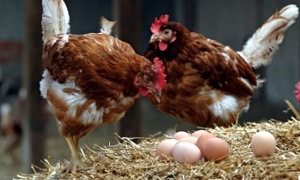
The mistaken belief that dirty eggs are more healthy and wholesome has contributed to a salmonella outbreak in Queensland, with 1,895 cases reported so far this year.
The state’s health department said this was 2.2 times as many cases than the same time last year, half of which were from the salmonella typhimurium strain linked to egg and chicken products.
The department’s health protection unit executive director, Sophie Dwyer, said an increase in raw egg consumption, poor food handling and hygiene standards, and consumption of cracked and dirty eggs had all contributed.
“One of the issues is that sometimes people think dirty eggs indicate they’re more healthy, or naturally produced,” Dwyer said.
“But if they are dirty it doesn’t mean they’re safer, they’re more hazardous.
“We are seeing a wider range of products being produced in the home and restaurants that include raw eggs. Products like aioli, mayonnaise, mousse and tiramisu use raw eggs and therefore don’t have a step that would kill any salmonella bacteria.”
Health authorities in the state are currently investigating the Grocer and Grind cafe in Broadbeach after several people fell ill after eating there. The cafe said in a statement on its Facebook page that it had “always practiced safe and law-abiding guidelines”.
And about 250 people, mostly school principals, contracted food poisoning after attending a Department of Education and Training conference at the Brisbane Convention and Exhibition Centre last month.
Meanwhile, Darling Downs Fresh Eggs, west of Brisbane, has voluntarily recalled its caged and mountain range eggs due to a potential risk of salmonella poisoning after dirty and cracked eggs were discovered.
There was no suggestion that Darling Downs Fresh Eggs was linked to any of the recent salmonella cases.
An infectious diseases doctor and microbiologist with the Australian National University, Peter Collignon, said salmonella cases were increasing each year, with more than 10,000 reported cases annually.
He said 75% of salmonella cases in Australia were a result of handling or eating raw eggs.
“It lives in the fecal matter on the outside of the egg, but the problem is, the eggshell is not impervious to bugs, which can be sucked inside the shell.
“The problem is that in Australia, we don’t take the same precautions as other countries do to keep salmonella rates down.”
The restaurant industry was a major source of contamination, he said, because it was impossible for consumers to tell which meals on a menu contained raw egg.
The US requires eggs to be pasteurised, heating them just enough to kill salmonella, while pasteurised eggs can be found throughout the UK.
“We need to take better control of eggs in the food chain,” Collignon said.
“While most people recover from salmonella, some do get very sick and die. We can get the number of salmonella cases down by 50% if we made our eggs safer.”
A study led by Flinders University and published in the International Journal of Environmental Research and Public Health last month found there was no strong evidence to suggest free-range, barn or cage eggs were different in salmonella rates.
“But given the current shift in consumers’ preference and desire for raw food products, there is a need for more informed guidelines regarding the preparation of foods containing raw eggs,” the authors concluded.
